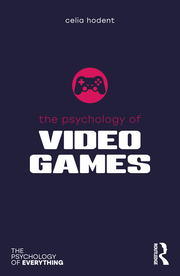
Billions of people around the world play video games, making gaming one of the most popular forms of entertainment today. Yet while we know there are many positive aspects to video games for learning and play, many still worry that they could also be bad for us. Video games have been accused of making players violent, isolated, dumb, or addicted. But what does academic research actually say? This is what I discuss in my most recent book, The Psychology of Video Games.
What are the potential positive impacts of playing video games?
Let start by exploring what has been relatively much less studied about games: whether they can be beneficial to players. Beyond the fact that play is overall good for cognitive and social development, videogame play has been found to have several notable benefits. In particular, certain commercial action games have been found to enhance visual attention skills. Other games have been explored for their potential to foster prosocial behavior.
Video games have also been studied for their potential to engage players for educational purposes. The most notable impact here is admittedly made by teachers and educators who are using certain existing games for education in class (such as Minecraft or SimCity). Nonetheless, some scholars argue that video games can help players develop a “growth mindset” (Dweck, 2006). The hypothesis here is that video games can encourage perseverance, which is generally recognized as being important in learning.
One last main area of exploration is whether video games can positively impact health and wellbeing. While some games are explicitly designed to treat children with attention deficit hyperactivity disorder, some commercial games like Animal Crossing: New Horizons have been found to be positively associated with affective well-being.
Overall, the research currently shows that in many cases video gameplay does yields benefit, although they haven’t been found to be quite as extraordinary as some video game enthusiasts might believe.
What are the potential negative impacts of playing video games?

One of the oldest concerns regarding video games is whether they can cause aggressive behavior in real life. Decades of research studying this area have so far mostly yielded heavy debates, yet no consensus on the matter. Nonetheless, there is currently no clear evidence that attributes real-life violence to video games, as the American Psychological Association (APA) pointed out in a 2020 resolution: “Attributing violence to violent video gaming is not scientifically sound and draws attention away from other factors.” Moreover, their potential association with mild aggressive behavior is highly debated among scholars and the medical community.
Another concern has been whether video games could negatively affect school performance (e.g. lack of attention at school). Here again, the results are highly debated among scholars. Some researchers found an association between video game play and poor grades, but others did not. It’s important to note here that when such association is found, it doesn’t say anything about a causal relationship. Correlation is not causation. It could very well be that children that have poor performance at school are more likely to play video games instead of doing their homework if they don’t feel competent at school. That being said, it’s obvious that if a child (or an adult) spends too much time playing games to the point that other activities are neglected (such as sleeping, doing school work, having a social life, etc.), it’s never good. Doing a variety of activities (including physical activity) and sleeping are very important for the brain, and even more so for brains in development. This leads us to another major concern about video games: can video games be “addictive”?
An increasing number of parents are worried about their children being “addicted” to certain video games. Addiction is a delicate and complex topic. It’s a pathology. While there isn’t a straightforward definition of what an addiction is, it’s generally considered as the encounter between a person, a context, and an object (product) that is causing significant distress to the person who feels a compulsion to consume the product despite harmful consequences. The object is usually a substance, such as heroin, alcohol, or tobacco, but sometimes it can be a behavior, such as gambling. Gambling disorder is currently the only behavioral addiction that is recognized by the DSM-5 (the manual used to diagnose mental disorders). But what about the other addictions that people talk about, such as sports addiction, shopping addiction, or video game addiction? It is true that some people in a certain context can develop a pathological relationship with a pleasurable habit, such as playing video games (its prevalence varies between studies, for example between 0.1% to 1% in one study, or 3.1% in another). In this sense, some people do have a pathological relationship with video games, and they need help. Nobody is disputing this fact. However, when the World Health Organization (WHO) announced in 2017 the introduction of a “gaming disorder” in the next International Classification of Disease, it has stirred a lot of debate and controversy among scholars who disagree with the creation of a new disorder related to playing video games. The media psychology divisions of the APA and Psychological Society of Ireland jointly released a statement disagreeing with the WHO diagnosis, pointing out that “the current research base is not sufficient for this disorder and that this disorder may be more a product of moral panic than good science”. On a side note, the same controversy applies to social media and the moral panic associated with it.
To clarify, scholars who disagree with the creation of a new “gaming disorder” claim that when a pathological relationship between a player and a video game emerges, it should be best viewed as a coping mechanism for stress and anxiety (the specific context in which the player is currently evolving), or as a way to satisfy basic psychological needs of competence, autonomy, and relatedness when these are not felt in real life. Finally, scholars also debate the proposed “gaming disorder” diagnosis criteria, because being engaged with a game and playing long hours is not enough for someone to be considered a pathological gamer. Clearly distinguishing between passionate gaming and pathological gaming is critical to avoid stigmas, and to avoid downplaying true addiction suffering.
Overall, the worries around video games seem greatly exaggerated. Video games, as a medium, are neither good nor bad by themselves. It greatly depends on the specific game, how it is consumed by the player, and why. Moreover, it is important to keep in mind that social relationships are very important to teenagers, and in today’s world (especially during a pandemic), video games are where a lot of social connections happen.
The Bottom Line
Over 2.8 billion people, including myself, have fun playing video games and the large majority of game creators are passionate about their work (I’ve been working in the video game industry for the past 13 years). Video games are an art form. They are a rich medium that offers a very diverse pool of experiences, some of which you play alone, others collaboratively, and others in competition with many other people. While the current moral panic around video games is greatly exaggerated, it remains important to point out the flaws of the game industry (most notably in monetization techniques) and to push for better ethical practices overall. The benefits of games are also exaggerated, yet certain games have added value in health and education. More funding to explore the positive impact of games could greatly help increase our understanding of them. But above all else, video games are just supposed to be fun.
 Celia Hodent is an expert in the application of cognitive science and psychology to improve products, systems, services, and video games. She currently leads an independent UX consultancy, working with a wide range of international media and enterprise companies. Celia is the author of The Gamer’s Brain: How Neuroscience and UX can Impact Video Game Design and The Psychology of Video Games.
Celia Hodent is an expert in the application of cognitive science and psychology to improve products, systems, services, and video games. She currently leads an independent UX consultancy, working with a wide range of international media and enterprise companies. Celia is the author of The Gamer’s Brain: How Neuroscience and UX can Impact Video Game Design and The Psychology of Video Games.

